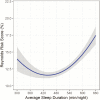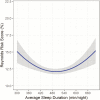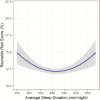Accelerometer-Measured Sleep Duration and Clinical Cardiovascular Risk Factor Scores in Older Women
- PMID: 31504216
- PMCID: PMC7494034
- DOI: 10.1093/gerona/glz201
Accelerometer-Measured Sleep Duration and Clinical Cardiovascular Risk Factor Scores in Older Women
Abstract
Background: Evidence suggests that short and long sleep durations are potential lifestyle factors associated with cardiovascular disease (CVD). Research on sleep duration and CVD risk is limited by use of self-report sleep measures, homogeneous populations, and studies on individual CVD risk factors. For women, risk of CVD and inadequate sleep duration increases with age. We hypothesized that accelerometer-measured sleep duration was associated with 10-year predicted probability of future CVD risk in a cohort of aging women.
Methods: This cross-sectional analysis included 3,367 older women (mean age 78.9 years; 53.3% White), from the Objective Physical Activity and Cardiovascular Health Study, ancillary study to the Women's Health Initiative. Women wore ActiGraph GT3X+ accelerometers on the hip for 24 hours/7 days. A 10-year predicted probability of future CVD risk, the Reynolds Risk Score (RRS), was computed using age, systolic blood pressure, high-sensitivity C-reactive protein (CRP), total and HDL cholesterol, diabetes mellitus status, smoking status, and family history of CVD. Average nightly sleep duration was derived from accelerometer data. Adjusted linear regression models investigated the association between sleep duration and RRS.
Results: Results suggested a U-shaped relationship between sleep duration and RRS, with both short and long sleep associated with higher RRS (p < .001). The association remained significant after adjustments for race/ethnicity, education, lifestyle factors, and health status indicators.
Conclusion: In older women, actigraphy-ascertained sleep duration was associated with a 10-year predicted probability of future CVD risk. This study supports sleep duration as a modifiable risk factor for CVD in older women.
Keywords: Accelerometers; Cardiovascular; Sleep; Successful aging.
© The Author(s) 2019. Published by Oxford University Press on behalf of The Gerontological Society of America. All rights reserved. For permissions, please e-mail: journals.permissions@oup.com.
Figures




References
-
- Goff DC, Lloyd-Jones DM, Bennett G, et al. . 2013. ACC/AHA guideline on the assessment of cardiovascular risk: a report of the American college of cardiology/American heart association task force on practice guidelines. J. Am. Coll. Cardiol. 2014;63:2935–2959. doi:10.1161/01.cir.0000437741.48606.98. - PMC - PubMed
-
- Cappuccio FP, Cooper D, D’Elia L, Strazzullo P, Miller MA. Sleep duration predicts cardiovascular outcomes: a systematic review and meta-analysis of prospective studies. Eur Heart J. 2011;32:1484–1492. doi:10.1093/eurheartj/ehr007 - PubMed
-
- Chaput J-P, McNeil J, Després J-P, Bouchard C, Tremblay A. Short sleep duration as a risk factor for the development of the metabolic syndrome in adults. Prev Med (Baltim). 2013;57:872–877. doi:10.1016/j.ypmed.2013.09.022 - PubMed
Publication types
MeSH terms
Grants and funding
LinkOut - more resources
Full Text Sources
Research Materials
Miscellaneous

